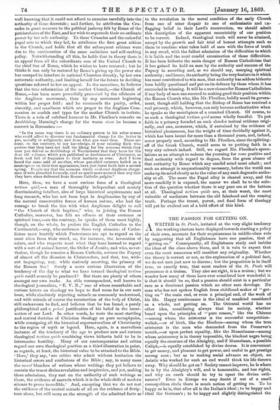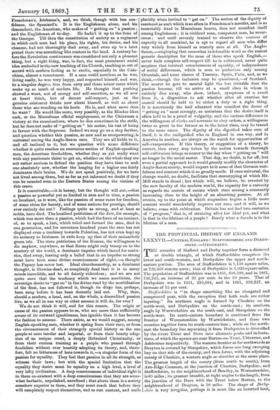THE PASSION FOR GETTING ON.
AWRITER in St. Paula, irritated at the very slight tendency the working electors have displayed towards starting a policy of their own, accounts for their acquiescence in middle-class rule by suggesting that all Englishmen have one passion, that of "getting on." Consequently, all Englishmen study and imbibe the ideas of the class above them, and it is vain to expect that even the most numerous will manifest any originality. Whether the theory is correct or not, as the explanation of a political fact, we do not care just now to discuss ; but the proposition is in itself true, so exactly true, that most readers of the St. Paula will pronounce it a truism. They also are right, it is a truism ; but we wonder how many of them have ever considered how wonderful it is that it should be so, that a passion should exist in a particular race as a dominant passion which no other race develops. No man who has not spoken English from childhood makes of "getting on" the main end, or even a principal end, of the work of his life. Happy continuance is the ideal of mankind considered as a whole, not getting on. The Oriental world has no other idea, considering always that its society, whether based upon the principles of "pure reason," like the Chinese —among whom the aristocrat is the successful competitionwallah,—or of birth, like the Hindoos—among whom the true aristocrat is the man who descended from the Preserver's mouth,—or upon perfect equality, like the Mussulmans—among whom aristocracy is in theory impossible, the blackest negro being equally the creature of the Almighty, and if Mussulman, a possible Caliph,—is equally established by divine decree. It is convenient to get money, and pleasant to get power, and useful to get prestige among men ; but as to making social advance an object, an Asiatic who worked for such an end would think his life thrown away. W by should he get on? Society cannot improve, he is where he is by the Almighty's will, and is honourable, and has rights, and why on earth should he try to upset the divine ordinances? Even in Europe we may doubt if out of a small cosmopolitan circle there is much notion of getting on. To be happy as he is, that after all is the Italian's ideal ; to be happy and ideal the German's ; to be happy and slightly distinguished the
Frenchman's, Irishman's, and, we think, though with less confidence, the Spaniard's. It is the Englishman alone, and his descendant, the American, who makes of "getting on" a passion ; and the Englishman of to-day. He hadn't it up to the time of the Georges. Till then the constitution of society as a regiment in which each man had his place, his rights, his duties, and his chances, had not thoroughly died away, and even up to a later period there was something like content in the land. A century before the Revolution continuance was considered not only a pleasant thing, but a right thing, was, in fact, the most prominent social idea embodied in the new teaching of the Church, teaching so out of accord with modern feeling as to excite, especially in the Catechism, almost a resentment. If a man could continue as he was, living easily, he was very happy, and respected himself, and was, to a singular degree, free from envy and those minor cares which make up so much of modern life. He thought that pushing showed a want, not of energy and self-assertion, as we all now at heart think, but of decent self-respect, just as the genuine aristocrat thinks now about himself, as well as about those who are treading on his heels. He is, and what more does he want ? He would like more, very possibly, as the Hindoo likes cash, or the Mussulman official employment, or the Chinaman a victory at the examinations, where he dies sometimes in the strife, but he does not make of "getting on" his motor, his test of being in favour with the Supreme. Indeed we may go on a step farther, and question whether this passion, so new and so overpowering, is universal among the Anglo-Saxon race. They are all liable to it, and all inclined to it, but we question with some diffidence whether it quite reaches an enormous section of English-speaking men, the American freeholders, whether they as yet really want with any passionate thirst to get on, whether on the whole they are not rather anxious to defend the position they have than to seek one absolutely new, whether the longing for a higher one fairly dominates their brains. We do not speak positively, for we have not lived among them, but as far as yet informed we doubt if they can be counted even in the Eastern States among the victims of this crave.
Is it conceivable,—it is heresy, but the thought will out,—that a passion so powerful yet so limited in area and in time, a passion so localized, as it were, like the passion of some races for freedom, of some cities for beauty, and of some nations for prestige, should ever entirely die out ? Feelings quite as strong, and at least as noble, have died. The localized patriotism of the Jew, for example, which was more than a passion, which had the force of an instinct, of, so to speak, a lust, which ruled and formed the man, died in one generation, and for seventeen hundred years the race has not displayed even a tendency towards Palestine, has not even kept up its memory as Irishmen in exile keep up that of their melancholy green isle. The stern patriotism of the Roman, the willingness to die anyhow, anywhere, so that Rome might only tramp on to the mastery of the world, a dominant impulse which lasted for centuries, died away, leaving only a belief that in an impulse so strong must have been some divine consciousness of right,—a thought the Papacy has never lost. Ideal churchmanship, as a dominant thought, is likewise dead, so completely dead that it is to many minds incredible, and to all faintly ridiculous ; and we are not quite sure that the tendency which we name asceticism, the sovereign desire to "get on" in the divine road by the mortification of the flesh, has not followed it, though its dirge has, perhaps, been sung before it has been decently laid out. Why, then, should a modern, a local, and, on the whole, a discredited passion live, as we all in one way or other assume it will do, for ever ?
We do not think it will, and for this reason. The origin or cause of the passion appears to us, who are more than sufficiently aware of its outward ignobleness, less ignoble than it has become the fashion to assume. There exists, as we would suggest, among English-speaking men, whether it spring from their race, or from the circumstances of their strangely special history as the one people at once insular and imperial, or from their hearty adoption of an unique creed, a deeply Hebraized Christianity, or from their curious training as a people who passed through feudalism without ever heartily adopting its theory, and, there fore, felt no bitterness of hate towards it,—a singular form of the passion for equality. They feel that passion in all its strength, as witness their laws ; but with the special limitation that the equality they desire must be equality on a high level, a level of very lofty civilization. A deep consciousness of individual right is in them co-existent with a deep consciousness that they are somewhat barbaric, unpolished, unrefined ; that above them is a society somehow superior to them, and they must reach that before they will completely respect themselves, and so rest content, and smile placidly when invited to "get on." The notion of the dignity of manhood as such which is so often in Frenchmen's mouths, and is so immutably fixed in Mussulman hearts, does not manifest itself among Englishmen ; it is civilized man, competent man, he reverences; and until severely trained to observe the nuances of capacity in all mankind, he is apt to regard all men who differ very widely from himself as scarcely men at all. The Anglo.. Saxon,—employing that somewhat indefensible word as the easiest generic description for the mass of those who speak English,— never feels complete self-respect till he is cultivated, never quite acquires that internal consciousness of equality, of independence of social differences, which is seen to perfection only among Orientals, and some classes of Tuscany, Spain, Paris, and, as we think,—though the inclusion may be questioned,—of Scotland. The nearer he gets to mental light the leas irritable does the passion become, till we arrive at a small class in whom it entirely dies away, who show, indeed, symptoms of a recoil from it, a disposition to ask whether after all exertion for oneself should be held to be either a duty or a right thing. It is notoriously the half educated who manifest the desire of "getting on" most strongly, so notorious that the desire itself is often held to be a proof of vulgarity, and the curious difference in the willingness of clerks and servants to obey orders, a willingness twice as great in the former as in the latter class, may be traced to the same cause. The dignity of the dignified takes care of itself, it is the undignified who in England in one way, and in America in another, are always on the watch for opportunities of self-exasperation. If this theory, or suggestion of a theory, be correct, then every step taken by the nation towards thorough self-cultivation brings us nearer to the day when "getting on" will no longer be the social motor. That day, no doubt, is far off, but even a partial approach to it would greatly modify the character of Anglo-Saxon society, would impart to it some of that German restfulness and content which it so greatly needs. If once universal, the change would, no doubt, facilitate that stereotyping of which Mr. Mill stands in dread ; but which will, we believe, be arrested by the new faculty of the modern world, the capacity for a curiosity as regards the secrets of nature which rises among a constantly increasing class to the height of an absorbing passion. At all events, up to the point at which stagnation begins a little more content would wonderfully improve our race, and it will, as we believe, come with cultivation. Britain has not had two centuries of "progress," that is, of straining after her ideal yet, and what is that in the lifetime of a people? Barely what a decade is in the lifetime of a man.































 Previous page
Previous page